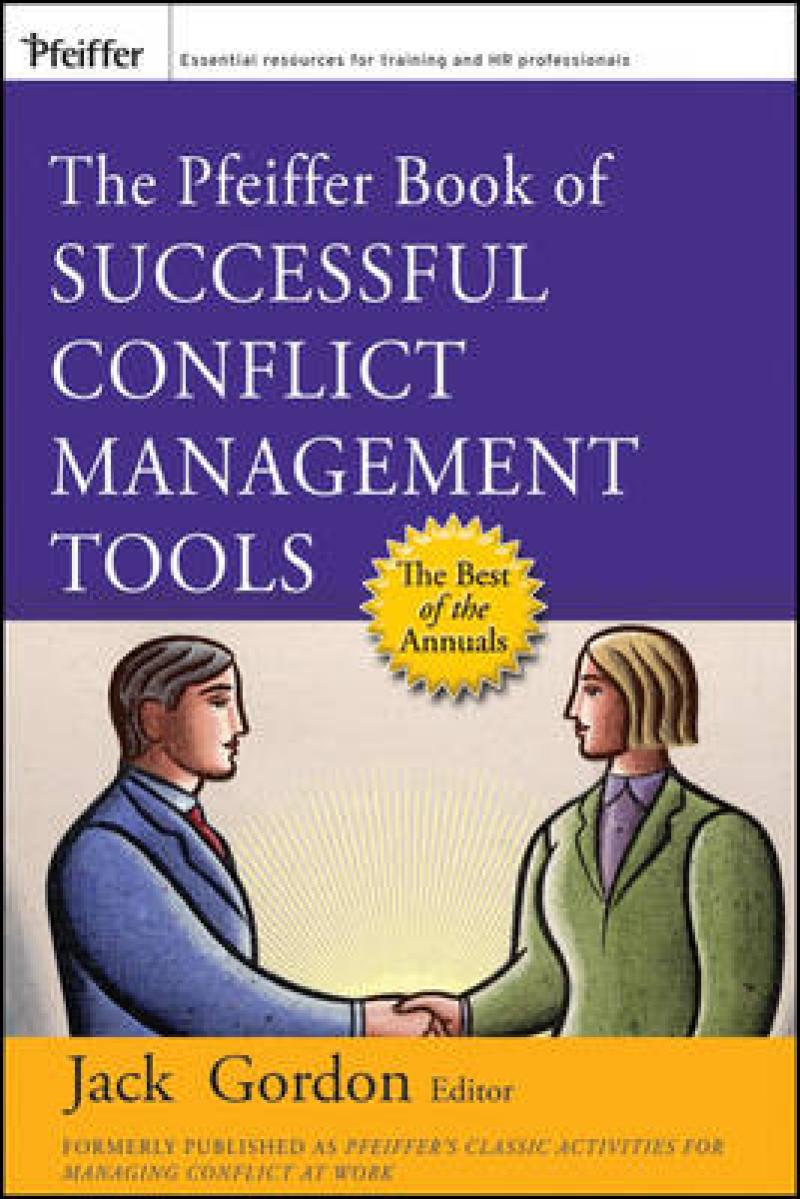The Pfeiffer Book of Successful Managing Conflict Tools is organized into three sections: Presentations and Discussions (articles); Experiential Learning Activities; and Inventories, Questionnaires, and Surveys. These selections represent the all-time best the Pfeiffer Annuals and Handbooks have to offer on the topic. The Pfeiffer Book of Successful Managing Conflict Tools Provides articles that offer timeless advice for dealing and classifying organizational conflictContains complete, ready-made training exercises designed to meet a variety of needs for different audiencesOffers inventories that include questionnaires and instruments that help participants recognize the destructive effects of hidden agendas and how to deal with them and surveys that encourage honest talk about controversial issues in the organization
Les mer
The Pfeiffer Book of Successful Managing Conflict Tools is organized into three sections: Presentations and Discussions (articles); Experiential Learning Activities; and Inventories, Questionnaires, and Surveys. These selections represent the all-time best the Pfeiffer Annuals and Handbooks have to offer on the topic.
Les mer
How to Use This Resource. About the Editor. Introduction. PART 1: PRESENTATION AND DISCUSSION RESOURCES. 1. The Art of Creative Fighting (H.B. Karp). 2. Conflict-Resolution Strategies (Joan A. Stepsis). 3. Win/Lose Situations (Gerry E. Wiley). 4. A Taxonomy of Intergroup Conflict-Resolution Strategies (Daniel C. Feldman). 5. Developing Collaboration in Organizations (Udai Pareek). 6. Constructive Conflict in Discussions: Learning to Manage Disagreements Effectively (Julia T. Wood). 7. Dealing with Disruptive People in Meetings (John E. Jones). 8. Confrontational Communication (Merna L. Skinner). 9. A Positive Approach to Resistance (H.B. Karp). 10. Breaking Down Boundaries: Breaking Through Resistance (Ron Ashkenas). PART 2: EXPERIENTIAL LEARNING ACTIVITIES. Experiential Learning Activities: Conflict and the Team . 1. What to Look for in Groups: An Observation Guide (Philip G. Hanson). 2. Conflict Styles: Organizational Decision Making (Donald T. Simpson). 3. Win As Much As You Can: An Intergroup Competition (W. Gellerman). 4. Power Poker: What’s in It for Me? (Linda Raudenbush and Steve Sugar). 5. Trouble in Manufacturing: Managing Interpersonal Conflict (John E. Oliver). 6. Dynasell: Hidden Agendas and Trust (William W. Kibler). 7. Current Status: A Feedback Activity on Trust (Robert N. Glenn). Experiential Learning Activities: Conflict and the Individual. 8. Retaliatory Cycle: Introducing the Elements of Conflict (Daniel Dana). 9. Alter Ego: Saying What You Mean (Duane C. Tway). 10. Conflict Role Play: Resolving Differences (Robert P. Belforti, Lauren A. Hagan, Ben Markens, Cheryl A. Monyak, Gary N. Powell, Karen Sykas Sighinolfi). 11. Resistance: A Role Play (H.B. Karp). 12. Neutral Corner: Deciding on an Issue (Linda Raudenbush and Steve Sugar). 13. Communication Games: Eliminating Unproductive (Don Morrison). 14. The Company Task Force: Dealing with Disruptive Behavior (Suzanne W. Whitcomb). Experiential Learning Activities: Conflict and the Organization. 15. Budget Cutting: Conflict and Consensus Seeking (Terry L. Maris). 16. Winterset High School: An Intergroup-Conflict Simulation (Charles E. List). 17. Crime-Fighting Task Force: Understanding Political Tactics in Groups (R. Bruce McAfee and Robert A. Herring III). 18. Piccadilly Manor: Improving Decision Making in a Political Milieu (A. Carol Rusaw). 19. Merger Mania: Understanding Intercultural Negotiation (John Chesser). 20. Lindell-Billings Corporation: A Confrontational Role Play (Thomas H. Patten, Jr). PART 3: INVENTORIES, QUESTIONNAIRES, AND SURVEYS. 1. Conflict Management Climate Index (Bob Crosby and John J. Scherer). 2. Cornerstones: A Measure of Trust in Work Relationships (Amy M. Birtel, Valerie C. Nellen, and Susan B. Wilkes). 3. The Team Effectiveness Critique (Mark Alexander). 4. Trust-Orientation Profile (Myron R. Chartier). 5. Conflict-Management Style Survey (Marc Robert). 6. Communication Audit: A Pairs Analysis (Scott B. Parry). 7. Inventory of Anger Communication (IAC) (Millard J. Bienvenu, Sr.). 8. The Defensiveness Inventory (Beverly Byrum-Robinson and B.J. Hennig).
Les mer
The Pfeiffer Book of Successful Conflict Management Tools This extraordinary resource includes the most successful conflict management tools selected from three decades of the Pfeiffer Annuals and Handbooks. Since 1972, trainers and consultants have found these volumes to contain a treasure chest of resources for a wide range of training and organization-development needs. The Pfeiffer Book of Successful Conflict Management Tools is organized into three sections: Presentations and Discussions (articles); Experiential Learning Activities; and Inventories, Questionnaires, and Surveys. These selections represent the all-time best the Pfeiffer Annuals and Handbooks have to offer on the topic. The Pfeiffer Book of Successful Conflict Management Tools: Provides articles that offer timeless advice for dealing with and classifyingorganizational conflict Contains complete, ready-made training exercises designed to meet a variety ofneeds for different audiences Offers inventories that include questionnaires and instruments that help participants recognize the destructive effects of hidden agendas and how to deal with them andsurveys that encourage honest talk about controversial issues in the organization The materials covered are selected not only for quality but with an eye toward serving a broad range of objectives and training situations. This resource is written to help develop the conflict management skills of people throughout the organization whether the relationship is manager-to-subordinate or peer-to-peer. The activities and instruments can be customized for all levels of the organization hierarchy. The Pfeiffer Book of Successful Conflict Management Tools offers the resources you need to help build better organizations for working people everywhere.
Les mer
Produktdetaljer
ISBN
9780470193440
Publisert
2007-11-13
Utgiver
Vendor
Pfeiffer
Vekt
535 gr
Høyde
229 mm
Bredde
155 mm
Dybde
33 mm
Aldersnivå
P, 06
Språk
Product language
Engelsk
Format
Product format
Heftet
Antall sider
452
Redaktør
Biographical note
Jack Gordon is a former chief editor of Training Magazine and an award-winning writer. He is the editor of numerous books, including The Pfeiffer Book of Successful Communication Skill-Building Tools and The Pfeiffer Book of Successful Leadership Development Tools.
